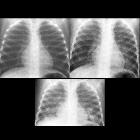Exogenous lipoid pneumonia

The
crazy-paving pattern: a radiological-pathological correlation. Exogenous lipid pneumonia. a Chest radiograph showed a decrease in lung translucency in the caudal region of the right lung with an air bronchogram. b Chest CT showed a crazy-paving pattern with areas of increased lung attenuation and with thickening of interlobular septa (1), even thickening of the intralobular interstitium (2). c Radiological-histopathological correlation. Histological examination showed alveoli filled with lipid particles (*), some ingested in macrophages (+) with the formation of lipid granulomas

Lipoid
pneumonia • Acute exogenous lipoid pneumonia - Ganzer Fall bei Radiopaedia

Exogenous
lipoid pneumonia • Chronic exogenous lipoid pneumonia - Ganzer Fall bei Radiopaedia

Exogenous
lipoid pneumonia caused by repeated sesame oil pulling: a report of two cases. The chest roentgenogram of a 66-year-old male with lipoid pneumonia. No abnormal shadows were detected 6 months prior to admission (a). Infiltrative shadows were noted in the bilateral lower lung fields on admission (b)

Exogenous
lipoid pneumonia caused by repeated sesame oil pulling: a report of two cases. Serial chest computed tomography images of a 66-year-old male with lipoid pneumonia. Ground-glass opacities with interlobular septal thickening (crazy-paving pattern) and partial infiltration in the right middle and bilateral lower lobes were observed on admission (a, b). The infiltrative shadow showed slight improvement after steroid pulse therapy (c). Subsequent bronchoalveolar lavage resulted in significant improvement (d)

Exogenous
lipoid pneumonia caused by repeated sesame oil pulling: a report of two cases. A chest roentgenogram and computed tomography images of a 38-year-old female with lipoid pneumonia. Infiltrative shadows were noted in the bilateral lower lung fields on admission (a). Chest CT revealed ground-glass opacities with interlobular septal thickening (crazy-paving pattern) and partial infiltration in the bilateral lower lung fields (b). The shadows improved 3 months later (c)
Exogenous lipoid pneumonia is a form of lipoid pneumonia. Please refer to the main article for a broader discussion.
In terms of the onset of the presentation, it can be divided into two different forms:
- acute exogenous lipoid pneumonia
- uncommon and typically is caused by an episode of aspiration of a large quantity of a petroleum-based product
- typically occurs in children due to accidental poisoning
- can also occur in performers who use liquid hydrocarbons for flame blowing (i.e. fire-eaters): hence also called fire-eater's pneumonia or fire-eater's lung
- uncommon and typically is caused by an episode of aspiration of a large quantity of a petroleum-based product
- chronic exogenous lipoid pneumonia
- usually results from repeated episodes of aspiration or inhalation of animal fat or mineral or vegetable oils over an extended period
- typically occurs in older patients but also has been reported in children as well as in infants when mineral oil is used as a lubricant to facilitate feeding
- also can occur in patients without a predisposing anatomic or functional abnormality in swallowing
- aspiration of fats or oils has been reported in patients with a history of chronic use of mineral oil or petroleum-based lubricants and decongestants
History and etymology
It was initially described in 1925 by Laughlen.
Siehe auch:

 Assoziationen und Differentialdiagnosen zu exogene Lipidpneumonie:
Assoziationen und Differentialdiagnosen zu exogene Lipidpneumonie:

